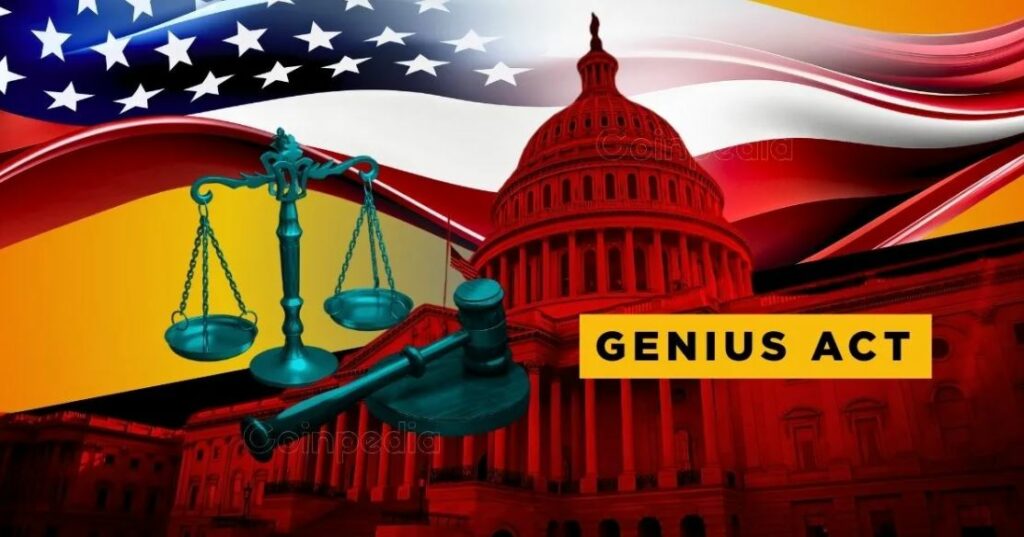
In a major step toward regulating the cryptocurrency industry, the U.S. Senate voted 66- 22 on Monday night to advance the GENIUS Act, a bill focused on establishing clear rules for stablecoins, a type of digital asset tied to real-world value such as the U.S. dollar.
This bipartisan vote included support from 16 Democrats, such as Sen. Cory Booker (D-N.J.) and Sen. Adam Schiff (D-Calif.), despite growing tensions around former President Donald Trump’s involvement in the crypto space.
Supporters believe the GENIUS Act could bring stability, innovation, and consumer protections to a rapidly expanding market. But critics say the bill doesn’t go far enough, especially when it comes to handling conflicts of interest and financial risk.

What Is the GENIUS Act?
The GENIUS Act (short for “Guaranteeing Effective National Investment and User Safety”) targets one specific area of crypto: stablecoins. These digital tokens are pegged to the value of assets like the U.S. dollar or gold, making them less volatile than traditional cryptocurrencies like Bitcoin or Ethereum.
Because of their price stability, stablecoins are used for payments, savings, and crypto trading. But without regulation, their reliability is uncertain, something this bill hopes to change.
The GENIUS Act would:
- Require stablecoin issuers to hold full reserves equal to the value of the coins they issue.
- Give coin holders priority in repayment if an issuer goes bankrupt.
- Enforce anti-money laundering and anti-terrorism financing rules for issuers.
- Ban members of Congress and senior executive officials from issuing stablecoins while in public office.
Why This Matters
The bill is the first serious federal attempt to set legal guardrails around the use and issuance of stablecoins.
Proponents say this is necessary to:
- Protect consumers in case a stablecoin fails or its issuer becomes insolvent.
- Create clear guidelines for traditional financial firms to enter the crypto market.
- Level the playing field so competition centers on the quality of service, not marketing hype or risky practices.
Christian Catalini, founder of the MIT Cryptoeconomics Lab, told ABC News, “This sets the stage for these assets to go mainstream.”
Catalini added that the law would take pressure off consumers to figure out which stablecoin projects are trustworthy, and instead push companies to innovate based on security and performance.
“This opens the floodgates,” he said. “You’ll see entry by many issuers. Consumers will all have more choices. This will bring more competition and innovation in payments.”
Who Supports the Bill?
The GENIUS Act has bipartisan backing and strong support from the crypto industry and tech policy leaders.
For financial institutions and fintech startups, the bill provides a legal framework they can work within, something that has been lacking in the U.S. for years.
Crypto advocates hope the law will also encourage global cooperation and bring clarity to investors, particularly as other countries like the UK, Japan, and Singapore roll out their own stablecoin regulations.
Who Opposes the Bill, And Why?
Despite the broad support, the bill has faced strong opposition from some progressive Democrats, including Sen. Elizabeth Warren (D-Mass.).
Warren criticized the measure on the Senate floor, calling it “worse than no bill at all.”
She argues that the GENIUS Act:
- Lacks strong enforcement mechanisms.
- Fails to fully address corruption risks in stablecoin issuance.
- Could open the door for political figures to exploit crypto for personal gain.
One major concern comes from the involvement of Donald Trump in the crypto market.

The Trump Controversy
In March 2025, a crypto firm called World Liberty Financial, reportedly backed by Trump, launched a stablecoin named USD1.
In early May, an Abu Dhabi-based investment company used USD1 to invest $2 billion into global crypto exchange Binance. Critics argue this deal could allow Trump’s firm to profit indirectly from foreign investments, raising red flags about ethics and political influence.
While Trump has denied wrongdoing, many lawmakers see this as a clear conflict of interest. Although the GENIUS Act includes a clause to prevent government officials from launching stablecoins while in office, Warren says that’s not enough.
“This bill provides even more opportunities to reward buyers of Trump’s coins with favors like tariff exemptions, pardons, and government appointments,” Warren said.
What’s Next?
Now that the Senate has voted to advance the bill, the GENIUS Act moves toward final approval, possibly within the coming weeks. It must still go through a full Senate vote, and then pass the House of Representatives before reaching the President’s desk.
Industry insiders expect the bill to pass, especially with increasing pressure for the U.S. to catch up to global crypto regulation trends.
If signed into law, the GENIUS Act could:
- Legitimize stablecoins for mainstream financial use.
- Encourage tech companies to build more stablecoin-based applications.
- Push regulatory agencies like the SEC and CFTC to define their crypto roles more clearly.
Final Thoughts
The GENIUS Act represents a pivotal moment for the future of cryptocurrency in the United States. With stablecoins playing a growing role in payments, savings, and investment, a solid legal framework could bring both innovation and protection.
But the bill also reveals a deeper tension in American politics, between welcoming new technology and guarding against political misuse of financial tools.
As the law moves forward, much will depend on how well it’s enforced and whether it can adapt to new challenges in a fast-moving crypto landscape.
For now, one thing is clear: Crypto is no longer the Wild West. Washington is watching and writing the rules.























